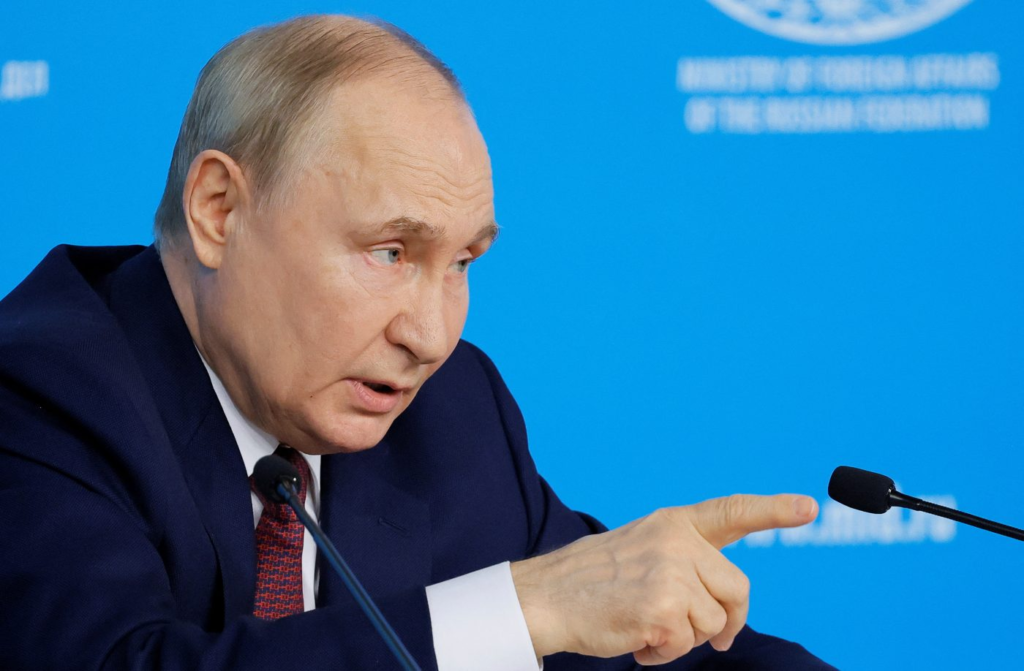Tensions between Russia and the West escalated further this week, as Russian President Vladimir Putin appeared to reject U.S. President Donald Trump’s proposed peace initiative aimed at ending the protracted war in Ukraine. Russian state media and top Kremlin allies have openly mocked the ceasefire framework, calling it ineffective and declaring it to be “in its death throes.”
In a stark editorial published Monday, the Moscow-based daily Moskovskij Komsomolets said Trump’s once-promising diplomatic momentum was now faltering,
The publication noted while Trump’s involvement initially pressured both Moscow and Kyiv to return to the negotiating table, the momentum has since dissipated.
“The Trump factor was significant and strong enough to get Moscow and Kyiv to the negotiating table,” the editorial read, “but judging by the current picture, it feels like Trump’s peace plan is dying a slow, but necessarily painful death.”
The sentiment was echoed in a report by BBC Russia Editor Steve Rosenberg, who observed that the Kremlin’s tone toward the American peace overture had turned sharply pessimistic. The editorial accused Trump of losing the energy he once brought to the peace process, stating: “The President’s energy charge has gone flat… It will soon become obvious even to Mr. Trump that any deal is in its death throes.”
Read More:
Russia will complete Ukraine operation, Putin declares
Russia claims victory over Ukrainian Forces in Kursk Region
Trump slams Zelensky for refusing to recognize Russian control of Crimea
Kremlin Prioritizes “Victory in Ukraine” Over Trump Relations
While the newspaper stressed that Russia does not wish to alienate Trump, it insisted that military success in Ukraine now takes precedence over diplomatic tact. “Not alienating Trump is desirable,” the editorial said, “but not at the expense of achieving victory in Ukraine.” This stance was reinforced by a provocative social media post from former Russian President Dmitry Medvedev, a key Putin ally. Medvedev shared a map on X (formerly Twitter) showing almost all of Ukraine as part of a Russian-controlled buffer zone, leaving only a small region next to Poland under Ukrainian control.
“If military aid to the Banderite regime continues,” Medvedev warned, “the buffer zone could look like this.”
Medvedev’s post was seen as a direct rebuke to proposals from the UK, France, and a 30-nation coalition, which had floated the idea of enforcing a Western-supervised buffer zone between Russian and Ukrainian forces.
Trump vs. Putin: From Allies to Adversaries?
Despite a history of cordial relations, Trump has recently expressed increasing frustration with Putin’s military aggression. Speaking from New Jersey over the weekend, the U.S. President said:
“I’ve known Putin a long time and always gotten along with him, but he’s sending rockets into cities and killing people. I don’t like it at all.”
On Truth Social, Trump went further, writing: “Putin has gone absolutely crazy… I’ve always said he wants all of Ukraine, not just a piece of it. If he does, it will lead to the downfall of Russia!”These comments mark a dramatic shift in tone from Trump, who has long been criticized for being soft on Moscow. The U.S. administration has yet to confirm whether it will impose further sanctions, but key allies in Europe and the UK are reportedly preparing new economic penalties targeting Russia’s energy and defense sectors.
Kremlin Response: ‘Emotional Overload’
Responding to Trump’s accusations, Kremlin spokesman Dmitry Peskov downplayed the U.S. President’s remarks, describing them as reflective of “emotional overload.”
“President Putin is making decisions necessary for the security of Russia,” Peskov said, suggesting Moscow will not shift course under external pressure.
As Ukraine’s President Volodymyr Zelensky continues to push for a 30-day ceasefire, with only low-ranking Russian officials attending talks in Turkey, the hope for a breakthrough remains dim. Without direct engagement from Putin, and with growing mockery from Kremlin insiders, Trump’s peace initiative may be losing traction fast.




